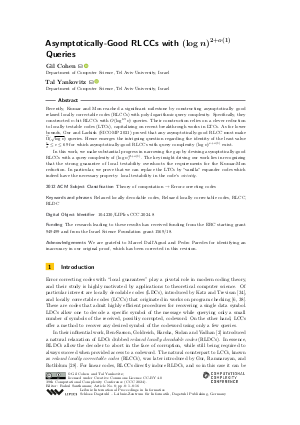@InProceedings{cohen_et_al:LIPIcs.CCC.2024.8,
author = {Cohen, Gil and Yankovitz, Tal},
title = {{Asymptotically-Good RLCCs with (log n)^(2+o(1)) Queries}},
booktitle = {39th Computational Complexity Conference (CCC 2024)},
pages = {8:1--8:16},
series = {Leibniz International Proceedings in Informatics (LIPIcs)},
ISBN = {978-3-95977-331-7},
ISSN = {1868-8969},
year = {2024},
volume = {300},
editor = {Santhanam, Rahul},
publisher = {Schloss Dagstuhl -- Leibniz-Zentrum f{\"u}r Informatik},
address = {Dagstuhl, Germany},
URL = {https://drops.dagstuhl.de/entities/document/10.4230/LIPIcs.CCC.2024.8},
URN = {urn:nbn:de:0030-drops-204045},
doi = {10.4230/LIPIcs.CCC.2024.8},
annote = {Keywords: Relaxed locally decodable codes, Relxaed locally correctable codes, RLCC, RLDC}
}

 Creative Commons Attribution 4.0 International license
Creative Commons Attribution 4.0 International license



































